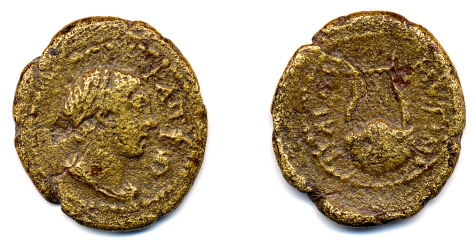Sappho was the original female singer-songwriter, an Ancient Greek Carol King or Joni Mitchell, whose songs were so memorable that people were still writing about them and passing them on centuries later.
Today her name is synonymous with lesbianism – indeed the very word ‘Lesbian’ comes from the name of the island where Sappho lived, Lesbos – due to the many lines of her poetry where she expresses strong, and sometimes sexual, feelings for other women. But there was more to Sappho than just her interest in women.
Sappho was born on Lesbos around 630BC into an aristocratic family. While it’s hard to nail down specific facts about her life, most historians find some agreement in that she had several brothers, was married and had a daughter called Kleis (or Cleis.)
She ran an academy for young women on Lesbos devoted to Aphrodite & Eros, which girls were sent to for arts education. It was some of these younger women who became the objects of Sappho’s affections in her poetry.
Often Sappho is called a poet, which she was, but that isn’t quite the full picture. She was a lyricist and the lines she crafted were designed to be sung, (accompanied by a lyre – from which the terms ‘lyric’ and ‘lyricist’ originate.) Some sources even suggest that Sappho invented the plectrum! It’s uncertain whether Sappho ever wrote her lyrics down, it’s perhaps more likely that she performed her songs, which people learned and later wrote down as they became popular.
One of the reasons she is so well remembered, even today, is that she innovated a new style of lyrical poem. It was the norm in Sappho’s time to write about the gods, most often rather objectively. Sappho bucked convention by writing in the first person and expressing her feelings and individual experience through her lyrics. Not only that, she created a new form of poetic structure which became known as the ‘Sapphic stanza’, and consists of 3 lines of equal length, followed by the 4th which is shorter. Here is an example from one of her poems:
Icy water babbles through apple branches
and roses leave shadow on the ground
and bright shaking leaves pour down
profound sleep.
Sappho became famous for her songs. Plato called her ‘the tenth muse’ and she earned the moniker of ‘The Poetess’ (counterpart to epic Greek poet Homer, who was known as ‘The Poet’.) There is also an account of one Athenian ruler who asked to be taught one of her songs and when asked why answered “Because I want to learn it and die.”
Her likeness even ended up on a Roman coin:

Today we’re left with mostly fragments of her poetry, with only one poem in its entirety. Down through the centuries responses to her passionate and amorous lines have varied. Predictably some have frowned upon her work; Pope Gregory VII burned it and one theologian famously called her “A sex-crazed whore who sings of her own wantonness”!

These days Sappho is most often remembered as an Ancient Greek lesbian poet; we have the word ‘Sapphic’ in our vocabulary, defined in the Oxford Dictionary as something “relating to lesbians or lesbianism”. However, although Sappho certainly expressed strong feelings for women in her poetry, historians acknowledge that she almost certainly had relationships with men too. One myth insists that she met her end when she threw herself over a cliff in an act of unrequited love for a ferryman named Phaon. This story does however seem unlikely, and some suggest that it was a rumour spread to mock Sappho and her well known love of women.
Whatever the truth about Sappho’s personal life (we will likely never know completely), it’s doubtless that she is one of the most well known female poets of all time, who had a massive impact on not only her own culture, but on many others since.
Find out more…
Listen to one of Sappho’s poems being lyrically performed as it might have been when she lived here.
Translations of Sappho’s verse abound today, you can read many online (here for example), or buy a collection (like this one.)
You can watch this documentary about Sappho’s life on YouTube:


Reblogged this on Lenora's Culture Center and Foray into History.